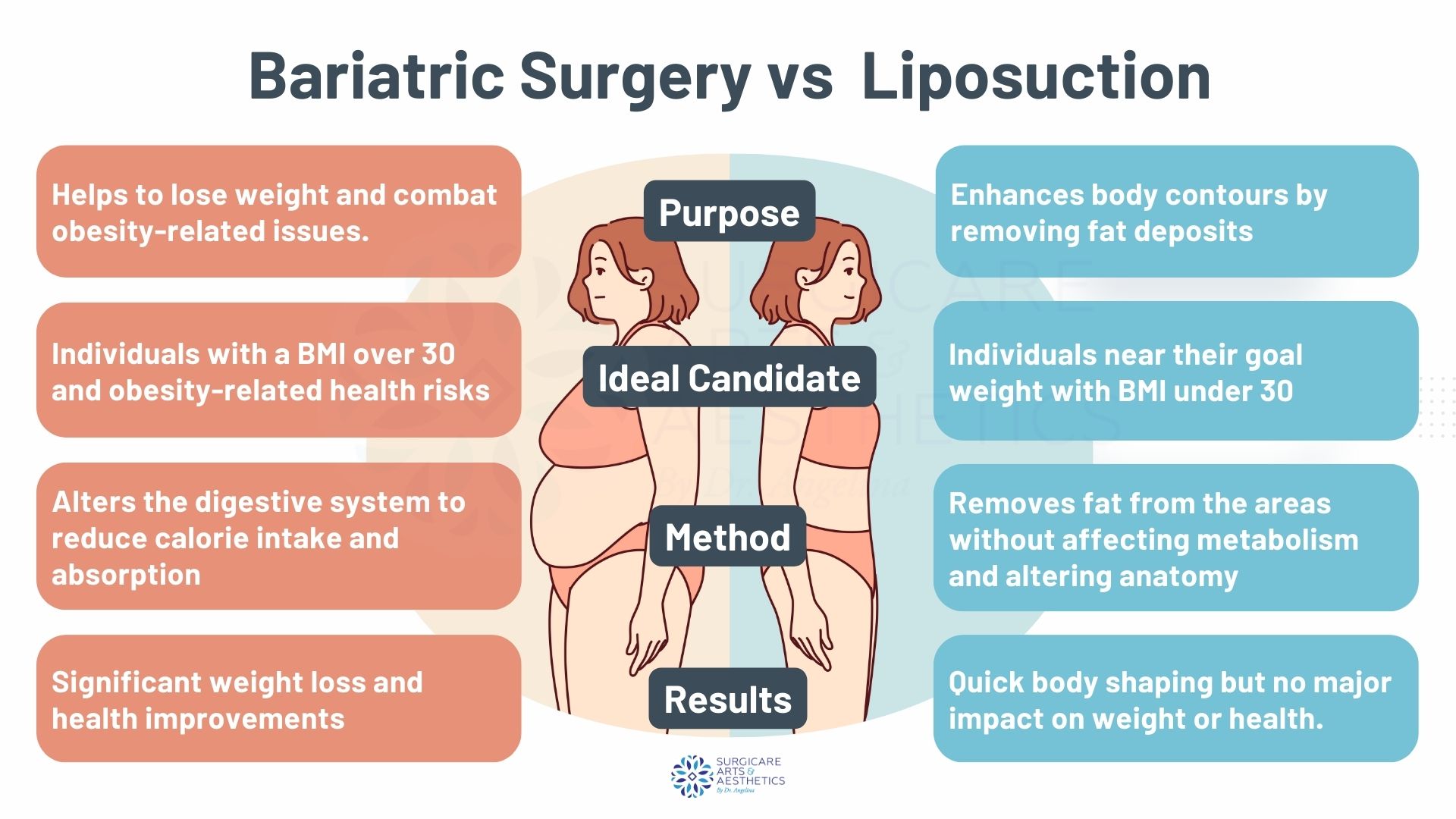Many people struggling with excess weight search for solutions to help them reduce their body mass index (BMI) in an effort to improve their health as well as their appearance. Your BMI level is derived from a quick calculation using your height and weight to provide a rough estimate of how much extra body fat you are carrying. The resulting BMI number is then put into a category that reflects if you are considered healthy, overweight, or obese.
Depending on where you fall on the BMI chart, you may consider undergoing bariatric surgery like a gastric sleeve or gastric bypass to help get your weight under control, or you may wonder if liposuction would be a feasible option to eliminate the excess fat. Both of these options are intended to eliminate excess fat, but they are not intended for the same purposes. How do you know which is right for you?
Today we are going to talk about bariatric surgery vs liposuction, how each of these surgeries works, what to expect from these two different procedures, and we will look at instances where bariatric surgery makes the most sense and when liposuction might be a better option.

What Is Bariatric Surgery?
Bariatric surgery is a medical intervention that can help individuals struggling with obesity to lose weight when conventional methods have been unsuccessful. Most patients lose a significant amount of weight after having bariatric surgery, and it is often doctor-recommended as a treatment for chronic and serious metabolic issues, such as high blood pressure or type 2 diabetes.
How Bariatric Surgery Works To Eliminate Excess Fat
During bariatric surgery, the patient’s stomach is significantly reduced in size to restrict the amount of food they can consume at one time. It can also involve alterations to the digestive system that limit the number of calories the body can absorb, which promotes the loss of weight and a reduction of excess fat. There are three main surgical bariatric procedures, including:
- Gastric sleeve surgery, which involves the permanent removal of about 80% of the patient’s stomach to limit food portions;
- Gastric bypass, which involves dividing the stomach into two unequal parts and rerouting a portion of the intestine.. The smaller stomach limits food consumption, and the alterations to the digestive system prevent the body from absorbing all the calories that were consumed;
- Duodenal Switch, which involves both a reduction in stomach size as well as a significant portion of the intestine rerouted to reduce the absorption of calories and nutrients.
Candidates For Bariatric Surgery
Individuals must meet several qualifications before they can undergo bariatric surgery, including:
- Have a body mass index (BMI) of 40 or higher, or a BMI of 35 or more with weight-related health issues, or at least 100 pounds overweight;
- Requirements specific to the bariatric surgeon who will perform your procedure;
- Requirements set forth by your medical insurance company if they are going to be responsible for some or all of the cost.
What Is Liposuction?
Liposuction is a cosmetic procedure that is performed to remove excess fat deposits from specific areas of the body to enhance appearance and proportions. Unlike bariatric surgery, it is not intended for significant weight loss or to treat any obesity-related health condition. It is often used after an individual undergoes bariatric surgery and loses a substantial amount of weight as a part of cosmetic surgery like a tummy tuck, thigh lift, arm lift, etc.
After tremendous weight loss, patients are often left with loose skin or localized fat deposits that do not respond to diet and exercise, or liposuction can be used to smooth and contour these areas so they appear more proportionate and natural-looking.
How Liposuction Works To Eliminate Excess Fat
During liposuction, Dr. Angelina injects a special numbing solution under the skin into the treatment area and uses a specialized tool called a cannula to help suction unwanted fat from the targeted area. She prefers Vaser liposuction because it uses ultrasound waves to help loosen the fat cells, making them easier to remove and gentler on the surrounding tissues. She can use liposuction to reshape and sculpt different areas of the body to provide her patients the results they want. For patients who have undergone bariatric surgery and have lost a great deal of weight, having liposuction can provide the finishing touch and allow the patient to see all their hard work pay off.
Liposuction is not intended to be a weight loss procedure, and for safety reasons, no patient can have more than 5 liters of fat removed during one session. It is possible to experience a few pounds of weight loss depending on how much excess fat you have removed.
Candidates For Liposuction
Liposuction is most often recommended to those who are at or near their ideal weight but who have areas of stubborn fat they have been unable to get rid of with diet and exercise. Candidates for liposuction should be in good health, non-smokers, and free from any medical conditions that could result in increased surgical risks or complications. Additionally, candidates should have a clear understanding of the results liposuction can and cannot provide.
Bariatric Surgery or Liposuction: What’s the Difference?
| Aspect | Bariatric Surgery | Liposuction |
|---|---|---|
| Purpose | Helps individuals lose a substantial amount of weight to improve their health and combat obesity-related conditions | Refines body contours and improves appearance by removing localized fat deposits |
| Ideal Candidate | Best for individuals with a BMI over 35 who face health risks due to obesity | Best for people who are already close to their goal weight (BMI of 30 and lower) and want to enhance the shape of their body |
| Method | Makes changes to the digestive system using surgery to limit the intake and sometimes absorption of calories | Permanently removes unwanted localized fat from targeted areas without affecting the digestive system or the individual’s metabolism |
| Results | Results in significant weight loss and better health when combined with lifestyle changes | Offers quick body-shaping results but is not a weight loss procedure and does not significantly impact an individual’s weight or health |
Weight Loss And Cosmetic Corrections After Bariatric Surgery
One common issue that patients face who lose a significant amount of weight is loose, sagging skin and localized fat deposits. This happens because the skin and the tissues underneath are not able to shrink back to fit the body’s new shape, and because weight loss is unpredictable, they may still have fat deposits in certain areas even though they have lost a great deal of weight.
If you are considering bariatric surgery, you may wish to work with a cosmetic surgeon as well as your bariatric surgeon from the start so you can have a complete plan for your body transformation. Bariatric surgery initiates weight loss, and cosmetic surgery coupled with liposuction can provide the finishing touches to the patient’s hard work. Some of the procedures that are common after bariatric surgery include:
- Tummy Tuck (Abdominoplasty) removes excess skin, tightens the abdominal muscles, and results in a smoother, more toned-looking abdominal area.
- Arm Lift (Brachioplasty) reshapes and tightens loose skin on the upper arms, resulting in more contoured and proportionate arms.
- Thigh Lift eliminates sagging skin and excess fat deposits on the thighs for a more toned but natural-looking appearance.
Now that we have compared bariatric surgery vs liposuction, it is clear that they serve very different purposes. Bariatric surgery is a treatment for individuals battling obesity and its related health conditions, and liposuction is the best choice for individuals who just need to remove localized fat deposits to provide mild to moderate enhancements to the shape of their body.
Plan Ahead And Be Prepared
Many patients undergo bariatric surgery anticipating the day when they will feel confident with their appearance, just to discover they have traded one issue for another. Understanding that this is a normal occurrence after a massive weight loss and having a plan to deal with any loose, hanging skin and leftover fat deposits can help patients be better able to navigate their way through this sometimes difficult phase of their weight loss journey.
Dr. Angelina Postoev, a triple board-certified cosmetic surgeon with IBI Plastic Surgery & Med Spa, has extensive experience working with bariatric surgery patients after weight loss. She uses her expert surgical technique and artistic precision to help provide her patients with the physical results they envisioned when their weight loss journey began. Bariatric surgery and cosmetic surgery offer the perfect blend of health and aesthetic benefits that boost an individual’s self-esteem and help them look and feel their best. Set up your consultation today to learn more about how the experts at IBI Plastic Surgery & Med Spa can help you enhance your post-weight-loss surgery results.







